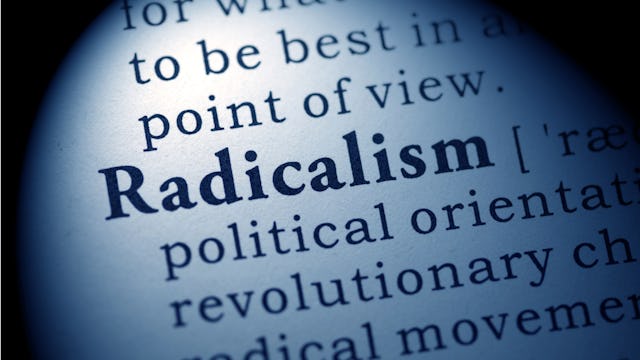Why Are White Terrorists Labeled 'Mentally Ill,' While Brown Terrorists Are 'Just Evil'?

In the wake of the stabbings on the Portland MAX train and the stabbings on London Bridge, I’ve been contemplating how differently the People of the Internet have responded to the perpetrators of these attacks. In my observations, after the initial shock, the white supremacist almost immediately got the “mentally ill” label, while I’ve heard nary a word about the mental health of the three men who decided driving a truck into a crowd and stabbing people at will was a good idea.
This dichotomy has been part and parcel of America’s mass shooting issues as well. White shooters like Dylann Roof, who killed nine black men and women at a church Bible study, or Elliot Rodger, who killed six people after writing a misogynistic manifesto, got baffled head shakes and conversations about how our country treats mental illness. While acknowledging the horrible nature of their crimes, media reports effectively made them out to be victims of a failed mental health system. No one in their right mind would shoot six or nine people point blank, right? Even if they were a rabid white supremacist or hateful misogynist.
Yet Omar Mateen, who killed 49 people at Pulse nightclub, was largely painted as simply a “radical Islamic terrorist,” end of story. While there was some chatter about the possibility of him being a self-hating, closeted homosexual, I don’t recall a whole lot of discussion about him being a byproduct of our faulty mental health system. But would anyone in their right mind go into a nightclub and shoot people?
I’m not saying any of these people should get a pass for the horrific crimes they committed. Mass murder is mass murder. But when our instinct is to look for mental health problems when a white person commits a heinous crime, but automatically fall to terms like “thuggery” or “pure evil” and overlook possible mental health issues when a brown or black person commits a heinous crime, we have a problem.
Dylann Roof and Elliot Rodger were extremists, full stop. Roof was a radical white supremacist whose hate drove him to murder nine innocent people who welcomed him into their church. Elliot Rodger was a radicalized misogynist who premeditatedly shot and killed six innocent people after stating in his manifesto, “I don’t know why you girls aren’t attracted to me, but I will punish you all for it. […] I’ll take great pleasure in slaughtering all of you.”
I’m not saying these men weren’t suffering from severe mental illness, but isn’t it possible that all terrorists who go out and commit mass murder aren’t entirely in their right mind, either? Were these men really that much different than a radicalized extremist of any other race or creed? Were their attacks any less scary or threatening to our country and society?
It sure feels like that’s the case for a lot of people. Is it because we feel like white perpetrators are outliers, which is why we automatically look to their mental health? Why do we tend to see white mass murderers grown on our own soil as mentally unfit and brown mass murderers from the other side of the world as perfectly in their right minds psychologically, but just evil?
These are serious questions. White supremacists have terrorized black and brown people in the U.S. for centuries. Most of those perpetrators have not been mentally ill in the clinical sense — they’ve been fueled by racism and emboldened by a society where racism has either been celebrated or tolerated.
And while “white terrorism” is a tricky thing to define and track. We do know that far-right extremists have been responsible for more terrorist attacks in the U.S. than radical jihadists. Are any of those attackers in their right mind? I would argue that anyone who commits mass murder is not of sound mind, and I’d bet you would agree.
But radicalization does that. Radicalization and extremism push people out of the psychological realms of normalcy, reason, and basic humanity. It’s an absolutely terrifying problem, and it’s vital that we address it. But it’s not a problem exclusive to the Middle East or to Islamists, and we need to stop acting like it is.
While not ignoring the subset of violent radicals from Muslim backgrounds, we need to focus on the radicalization of disgruntled young white men right here in our own country. They are not all “lone wolves,” and they are not all classic “mental health” cases. They have friends and acquaintances. They belong to groups and organizations and networks that spew hate and fuel prejudice. They follow social media pages that feed their extreme views and lead them to believe they are at war with the object of their hatred. There are clear parallels between their radicalization and the radicalization of jihadists.
If radical Islamist extremists with suicide vests and hearts full of hatred scare us, then radical extremist white folks with easy access to guns and hearts full of hatred should scare us just as much. And when either one of those extremists goes off and murders multiple people, there shouldn’t be such a distinct difference in the way that we analyze their actions or their psychological state. Extremism is extremism. Radicalization is radicalization. Murder is murder. Brown or white or any other shade. Muslim or Christian or any other creed.
If you ask me, every last one of them is out of their minds. But let’s stop giving all “American-looking” killers (white males, specifically) the psychological benefit of the doubt if we aren’t willing to do the same for others, simply because we let our biases (implicit or otherwise) creep in and view them as “other” or less than. White males can be radicals and extremists too, and it’s time we view this crucial topic through that lens.